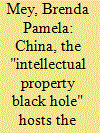| Srl | Item |
| 1 |
ID:
086957


|
|
|
|
|
| Publication |
2009.
|
| Summary/Abstract |
After a hard-fought battle that saw China clinch the bid to host the XXIX Olympic Games, the country put comparable efforts into upgrading its intellectual property laws, not only to bring them into consonance with the provisions of the Agreement on Trade-Related Aspects of Intellectual Property Rights (TRIPS), but also to accord the Olympic-related intellectual property rights the appropriate protection. Despite these efforts, China is still plagued with a myriad of TRIPS compliance problems. The Olympic Games presented the opportunity that China needed to light the torch that would help it repair the damage caused to its image by issues such as reverse engineering of almost everything under the sun, as well as those relating to enforcement and protection of intellectual property rights (IPRs), etc., and cause it to be seen in a positive light by the rest of the world. The world watched China closely for the weeks of the Olympic Games and will be watching it, even after the Olympic torch has flickered out, to see whether the enforcement and protection of IPRs will outlast the Olympic ceremony.
|
|
|
|
|
|
|
|
|
|
|
|
|
|
|
|
| 2 |
ID:
086956


|
|
|
|
|
| Publication |
2009.
|
| Summary/Abstract |
The application of intellectual property rights (IP) in developing countries is and remains highly controversial, particularly as regards applications to food/agriculture, and pharmaceuticals, which have direct ramifications for large numbers of peoples. One dimension complicating a reasoned dialogue on the public benefits of IP, particularly when many developing countries are implementing the Agreement on Trade-Related Aspects of Intellectual Property Rights (TRIPS) as mandated by membership in the World Trade Organization, is a dearth of information on their actual operation and effects. In this study, we address one particular aspect of the limited documentation on the effects of IP systems, the effect of plant variety protection (PVP) on the genetic productivity potential of varieties. Specifically, we examine wheat varieties in Washington State, United States, which are produced by both public and private sector breeders. Results from the study show that implementation of PVP attracted private investment in open pollinated crops such as wheat in the United States and provided greater numbers of varieties of these crops, which are high yielding from both the public and private sectors. These results may provide some insights for policy makers from developing countries on the effects of IP for plants as their TRIPS commitments are being implemented.
|
|
|
|
|
|
|
|
|
|
|
|
|
|
|
|
| 3 |
ID:
086954


|
|
|
|
|
| Publication |
2009.
|
| Summary/Abstract |
The Quanta judgement clarifies the US patent exhaustion doctrine on the basis of an authorized sale by the patent holder. It also contributes to the prism of patent-antitrust-contract laws to scrutinize contractual restrictions better on downstream purchasers. There are two main steps in the process of applying this prism. The first step is to determine the patent exhaustion issue. The second step is to evaluate such contractual restrictions through either the intersection of patent and antitrust laws or the intersection of contract and antitrust laws, or both intersections in some special cases. The correctness of determining both whether patent exhaustion is triggered and how antitrust law intervenes as a second filter plays a very important role in applying the Quanta-inspired prism. Through this prism, some Federal Circuit's decisions are re-visited, and the European Union perspective is analyzed in comparison with the US perspective. This article concludes that patent holders' contractual restrictions on downstream purchasers will be properly scrutinized under the prism of patent-antitrust-contract laws if promoting innovation and competition on the market as well as protecting customer welfare are respected.
|
|
|
|
|
|
|
|
|
|
|
|
|
|
|
|
| 4 |
ID:
086955


|
|
|
|
|
| Publication |
2009.
|
| Summary/Abstract |
The accepted wisdom is that the patent system originated in Europe and that China did not have such an indigenous system throughout its history. The reasons for the lack of such a system are not often explored among legal scholars although, for decades, historians have debated on a related matter of why the Industrial Revolution did not start in China after its centuries' lead in science and technology. It appears that legal scholars generally accept that Confucian philosophy precluded an intellectual property system in China including a patent system. The article aims to dispute this belief by showing that socioeconomic and geographical factors underscored the main reasons for the lack of a patent system in ancient China.
|
|
|
|
|
|
|
|
|
|
|
|
|
|
|
|